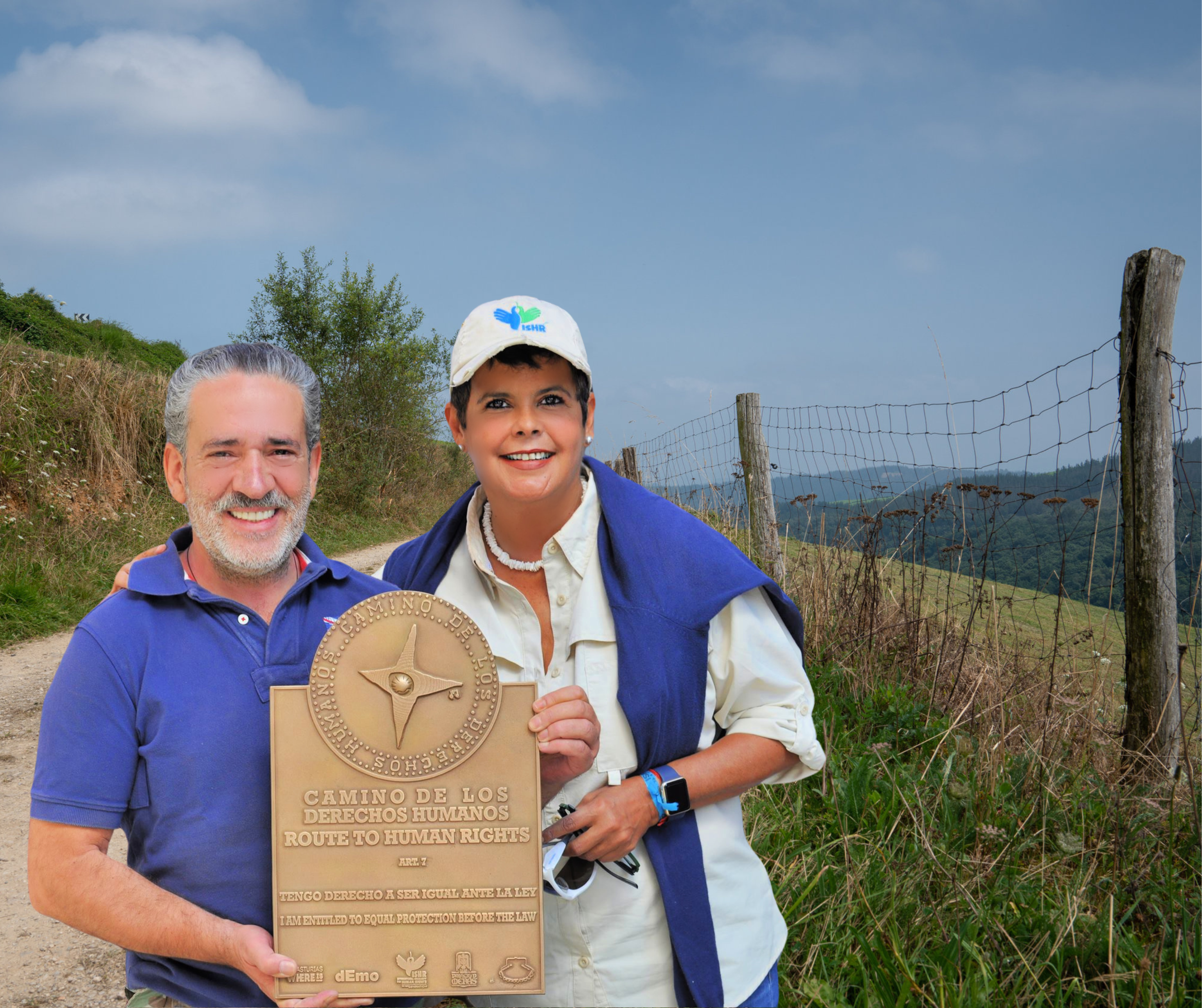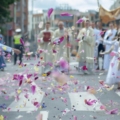When a pilgrim puts on boots, grabs a backpack and sets out to walk through mountains and fields, enjoying the hospitality of the people and meeting people of different origins, beliefs and social classes, the Declaration of Human Rights becomes a tangible reality.
This is the conviction driving the efforts of two important American women of Venezuelan origin: Devorah Sasha and Elizabeth Sanchez-Vegas, partners and founders of ISHRights, an institution dedicated to promoting education in the human rights enshrined in the 1948 Declaration.
Walking the Camino de Santiago together made them realize its educational and experiential potential. This is how the Route to Human Rights initiative was born, with the support WhereIsIsAsturias, marking the road from Oviedo to Compostela with the 30 articles comprising the Universal Declaration. In this interview, they share their experience.
- How, when and why was ISHR born? Do you think promoting human rights in the 21st century is necessary?
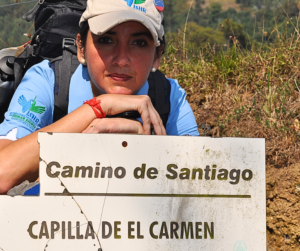
International Solidarity for Human Rights (ISHR) was established in 2008, recognizing the urgent need to educate and raise awareness about human rights worldwide. On December 10, 1948, the United Nations General Assembly adopted and proclaimed the Universal Declaration of Human Rights, in response to the tragedies of World War II. This Declaration was unanimously adopted with the mandate that it be distributed, displayed, read and discussed in schools and other educational institutions throughout the world.
Unfortunately, this has not been the case –at all. Today, barely 5% of the world’s population is actually aware of the Declaration. Even more, only 1% (approximately 4 million people) have actually read it. These numbers clearly show the urgent need not only to promote the Declaration, but also to deepen human rights education.
ISHR is dedicated to developing artistic and educational programs that make human rights accessible and understandable to people of all ages and backgrounds. The organization’s mission is to foster a culture of respect and promotion of human rights worldwide by engaging communities in activities that highlight their importance in everyday life.
Promoting human rights in the 21st century is critical, because of persistent global inequalities and new threats posed by technology and globalization. These modern challenges require continued attention to ensure that no one is left behind and that fundamental freedoms are upheld in a rapidly changing world.
- Devorah, you are a well-known figure in the world of Latin lyrical song. How did you become a promoter of human rights?
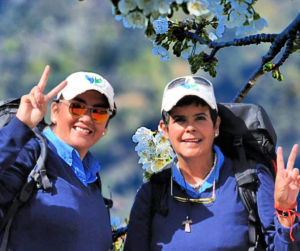
For years, my life revolved exclusively around Latin music and lyrics. However, when faced with the oppression and loss of basic freedoms in my home country, I began to deeply question my circumstances. This personal crisis led me to emigrate to the United States in search of safety and new opportunities. It was during this transitional period that I came across the Universal Declaration of Human Rights. I was surprised to discover that, being an educated artist, I had never explored these fundamental rights.
This discovery was a real wake-up call. I felt a mixture of indignation and responsibility, wondering how something so fundamental could have gone unnoticed. From that moment on, I committed myself not only to educating myself about human rights, but also to disseminating this vital information. While I remain an artist at heart and continue my musical career, I now have a parallel and deeply meaningful mission: to empower new generations to be aware of their rights and know how to defend them.
- Elizabeth, you come from communications and media, but you are now devoted to promoting human rights. What led you down this path?
Everything changed the day I discovered the Universal Declaration of Human Rights. When I read it, I fell deeply in love with its principles and promises. That moment became a real turning point for me. I understood the immense value of its ideals and, little by little, life led me towards education.
As a communications professional, I feel obliged to promote these rights. Talking about the beauty of this document has become a personal mission. The Declaration embodies the ideals of dignity, freedom, equality, and justice for all human beings, and makes us strive and hope for a world where we can all live free from fear and want.
This discovery redirected my career and redefined my purpose. I now devote my efforts to teaching and disseminating these fundamental rights, convinced that knowing and understanding them are essential if we want to build a more just, humane world.
- What brought Devorah and Elizabeth together in this fight?
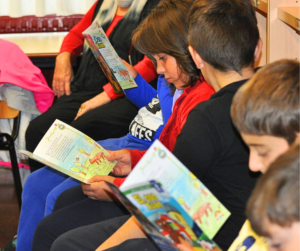
We are connected by passion and art. Passion fuels our creativity, but also strengthens our commitment to human rights, transcending our individual expressions. Art, in turn, becomes a bridge –a poetic way to connect emotions and thoughts, to reach hearts and minds with a transformative power. Our ability to capture and hold an audience’s attention is the result of years of practice and a keen understanding of how to communicate effectively. This skill, combined with our passion for justice and equality, allows us to inspire, educate, and promote meaningful change.
- Why did you choose Eleanor Roosevelt as your inspirational figure?
Eleanor Roosevelt’s unwavering commitment to human rights, her ability to overcome personal adversity, and her dedication to social justice are all sources of inspiration. Furthermore, her life is a testament to resilience, empathy, and leadership. As First Lady of the United States, she was known for her tireless advocacy for the rights of women, migrant workers and the African-American community. Harry Truman called her “the First Lady of the World” for her global influence.
Eleanor was a multifaceted woman, but there was one quality that shone above them all: her indomitable spirit in the fight against inequality, and her tireless dedication to the cause of human rights. As she herself said: “It is not enough to talk about peace, you have to believe in it. And it is not enough to believe in it, you have to work for it.”
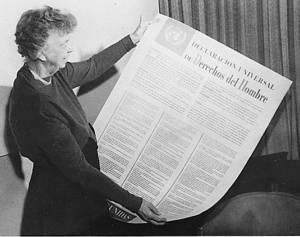
She played a crucial role in the drafting and adoption of the Universal Declaration of Human Rights, navigating the philosophical and political debates between the U.S. and Soviet blocs, and using his influence to build consensus. She also wrote the newspaper column “My Day” for nearly 27 years, using this platform to advocate for social and political causes.
Never accepting the merely “decorative” role reserved for first ladies in her day and age, she became a leading activist for civil rights and social justice. Her legacy reminds us of the importance of action and dedication in promoting peace and justice, and she remains an iconic figure for all those who strive for a more just and equitable world.
- Why did you choose the concept of the Camino to promote human rights?
We chose the Primitive Way because of its historical meaning but also because, when walking it, human rights are practiced naturally and spontaneously. The Primitive Way is the first and oldest route of the Way of Saint James, just as the Universal Declaration of Human Rights is the first comprehensive document establishing universal rights.
On the Camino, pilgrims exercise many fundamental rights without realizing it. They enjoy freedom of transit, the right to culture, freedom of expression, freedom of religion, the right to medical care, the right to food, and the right to decent housing. This experience reflects how human rights are integrated into our lives in an organic and tangible way.
The Camino de Santiago allows us to show, in a concrete and accessible way, how the principles of the Universal Declaration of Human Rights can be lived on a daily basis. On the Camino we are all equal, regardless of our origins, race, gender or religion. In it, the values of equality and solidarity that are at the heart of human rights are clearly manifested.
- Which human right do you think we need to prioritize in today’s world?
No human right is more important than another. None takes precedence over the others. The 30 articles of the Universal Declaration of Human Rights are all fundamental. The violation of one of these articles implies the violation of every single other: each human right is a link in the chain of dignity and justice. When one of these links is broken or ignored, the chain is weakened, and the protection of human rights is compromised. Each human right acts as a pillar supporting the structure of a just and equitable society.
- You love the Way of Saint James, especially the Primitive Way. Why did you choose it, and what inspires you when you walk it?
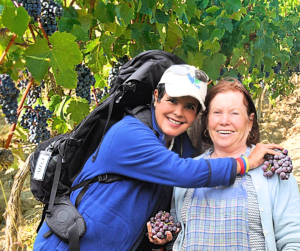
The Primitive Way captivated us from the first moment. Unlike other, more crowded trails, the Primitivo is less traveled and offers a much more intimate and personal experience. As we walked through it, we felt in communion with the pilgrims who also sought a deeper meaning to their journey, centuries ago.
This path takes us through stunning landscapes: lush forests, majestic mountains and small, charming villages. Each step reinforces our connection to nature and motivates us to reflect on the relevance of human rights, rooted in both history and geography. As we move forward, it is as if the road itself speaks to you, urging you to remember the urgent need to defend the dignity and equality of all people.
We cannot help but be grateful for the hospitality of all those we have met along the way. Pilgrims, locals, businesspeople, teachers, religious, students, children, elders, representatives of various governments –they all have welcomed us with open arms. These many interactions deeply enrich our experience, offering us a mosaic of stories and cultures. This generous hospitality moves us forward, fostering a spirit of solidarity and mutual understanding that transcends backgrounds and beliefs. The Primitive Way is a journey to understanding and appreciating what unites us as human beings.
- Can we transfer the experience of the Primitive Way to other pilgrimage paths in the world?
Yes, absolutely. This can be perfectly done with other roads in the world. This route is not only a physical journey, but also a profound journey of reflection on the universal values of human dignity, justice and equality. And these principles are not limited to a specific geographical location.
By extending this experience to other trails, a global dialogue on human rights can be promoted, using the richness of different landscapes, cultures and histories to deepen understanding and commitment to these rights.
In addition, the integration of this urgent matter into different pilgrimage routes can serve as a powerful reminder that human rights are universal and relevant in all contexts, promoting broader global awareness and respect.



